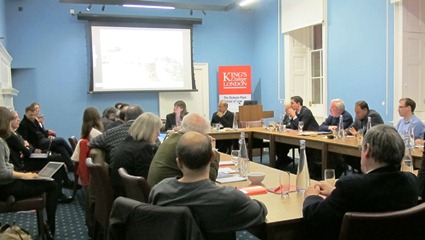Thought Leadership Forum: Global Tax Justice & Illicit Financial Flows

The Dickson Poon School of Law, King’s College London, hosted a Thought Leadership Forum on ‘Global Tax Justice & Illicit Financial Flows’ on Friday 22 November.
The forum was attended by a distinguished group of legal practitioners, legal academics, philosophers, NGO and government representatives, and consultants. The theme of “Global Tax Justice” was inspired by the report produced by a task force convened by the International Bar Association, and chaired by Professor Thomas Pogge, titled Tax Abuses, Poverty and Human Rights; and, additionally, by the research and advocacy of Krishen Mehta, of the Aspen Institute and Tax Justice Network.
The evening was arranged to coincide with a workshop consisting of experts on global tax justice, convened by Professor Pogge, who is the Visiting Professor of Philosophy & Global Justice at The Dickson Poon School of Law and Director of the Global Justice Programme at Yale. The workshop was held over the weekend of 23-24 November, and will produce an important collection of papers addressing the topic of global tax justice.
The Thought Leadership Forum, convened by Krishen Mehta, was an evening roundtable discussion that sought to discuss and challenge the proper role of governments in responding to calls for global tax justice, and to consider various ways in which national legislatures might react to suggestions for reform of national and international tax structures. The discussion was focused on the potential, causative intersection between abuse of the tax system and poverty, against a broader background of international human rights.
Three key sessions were convened at the event.
Session one: devoted to advocacy, and led by Anthea Lawson (Global Witness), Nuria Molina (ActionAid), and Professor Itai Grinberg (Georgetown University School of Law, US Treasury, Office of International Tax Counsel)
Anthea Lawson presented a provocative and moving account of links between corrupt money flows, and international tax structures. Her observations were supported by Nuria Molina, who, whilst optimistic about current political will for change of the international tax system, emphasised the need “to move from agenda setting to policy change.” Itai Grinberg agreed that there is a substantial scope for consensus around targeted reform, of banking secrecy in particular. He proposed that the US’ Foreign Account Tax Compliance Act (FATCA) has had the single biggest global impact upon this debate, and was likely to continue to influence global discussion of the ways in which banks may act as cross-border tax agents.
Session two: devoted to the possibility of changes in the law, and led by Professor Reuven Avi Yonah (Irwin I. Cohn Professor of Law, University of Michigan Law School) and Professor Lorraine Eden (Texas A&M University).
Reuven Avi Yonah clarified the basis of discussion: there is a great deal of debate about the precise nature of the problems in the international tax system, and yet insufficient discussion of what, exactly, the results of change should be. Many arguments – for example, about the desirability of enforcing withholding taxation – are based upon an assumption that countries around the world may be unable to cooperate. NGOs, he suggested, have the opportunity to influence the direction of debate simply by encouraging greater cooperation. Lorraine Eden supported these observations, and drew attention to the role that wealthier countries may play by “setting a level” against which developing countries may consider their own rates of taxation.
Session three: devoted to advisers, and led by Professor Anne Fairpo (Thirteen Old Square Chambers and visiting professor at King’s College London), with concluding remarks from Professor Stephen Cohen (Georgetown Law Center, and US Deputy Assistant Secretary of State for Human Rights from 1978-80).
Anne Fairpo explained that the challenge for advisers lies in the rule of law. Required to take human rights into account, lawyers work quite substantially to assist fairness and justice – in essence, to act as gatekeepers. Advisers, generally, she explained, should work with the tax authorities to improve their ability to collect taxes which are due. The challenge, as Stephen Cohen emphasised in his closing remarks, is to address lobbying and other efforts to resist change.
In the discussion that followed, a range of perspectives was brought to bear on shaping the discourse of global tax justice and illicit financial flows.
These included:
- The need to identify and to clarify tax issues in discussions centering on corruption and poverty (as suggested by Professor David Southern, Temple Tax Chambers), and, concomitantly, to exercise flexibility in the identification of tax law’s impact (Sol Picciotto, Emeritus Professor of law at Lancaster University);
- The need both to work with, and to support, businesses, and their advisers, both of whom may face significant pressures (Professor Freedman);
- The value of creating an international human rights perspective on issues such as offshore accounts, which may help to motivate change (Professor Cohen).
Krishen Mehta welcomed the accomplishments of the forum. He explained that, in many countries where corruption and poverty dominate, it is very possible to discern calls for economic justice and structural change. Fora such as these serve an important function, as enabling events in a global mobilsation for action.
The forum was chaired by Dr Ann Mumford, Reader in Taxation Law, and generously funded by the Dickson Poon gift.
This event was part of a Thought Leadership Forum series at The Dickson Poon School of Law.
See forthcoming events from The Dickson Poon School of Law